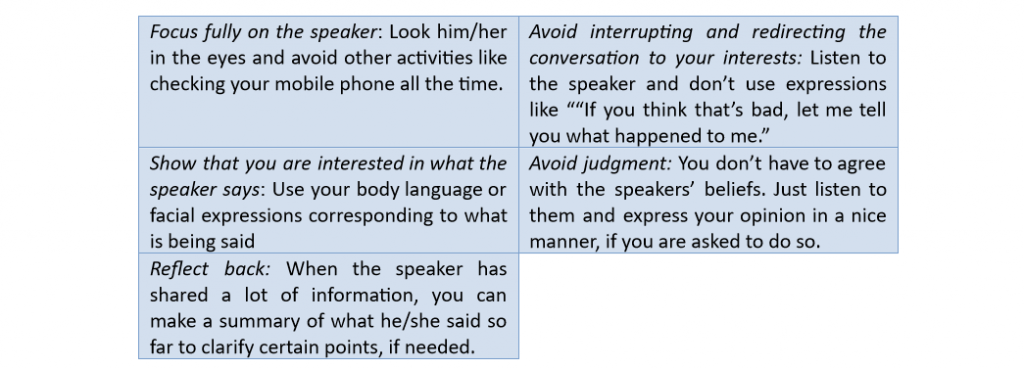Social – management

Understand relationships
Relationship is the state of being connected with one or more people. Understanding in a relationship means “being able to relate and comprehend the logic behind someone’s actions” (Oppong, 2019). It has a lot to do with emotional intelligence.
How to be more understanding in a relationship (Villalon, 2021)
- Take time and try to get to know the other person better. When you are aware of his/her feelings, strengths, weaknesses, fears, it is easier to understand him/her better.
- Recognize your own feelings and motives.
- Avoid imposing your beliefs and ideas. Remember that your goal is to understand the others, so you have to respect their own convictions as a part of who they really are.
- Respect others’ needs. Encourage them to pursue their goals and live their lives even in your absence.
- Keep in mind that you are not always right.
- Learn how to negotiate and compromise. Find a common ground, where both sides feel satisfied or agree to disagree.
- Give others time to explain before reacting. Don’t be quick on your judgment.
- Choose kindness over anger. Try to explain in a nice manner what hurt you, so that it won’t be repeated.
- Encourage others to be more open and express themselves. Nothing is more important than opening up and sharing your thoughts and feelings.
Communicate effectively
Effective communication is the ability to understand not only the information of a message, but also the intentions and emotions behind it. In order to communicate effectively, we have to convey a message clearly, but we definitely need to listen to the message carefully, so that the sender feels heard and understood (Robinson, n.d.).
Skills for effective communication
Effective communication can be precluded due to lack of focus on the speaker, inconsistent body language, avoidance of nonverbal signals and lack of emotional control. However, it can be improved by practicing some skills (Robinson, n.d.):
Skill 1
Practice active listening: When we communicate we have to focus, as mentioned before, not only on the message, but also on the emotion behind the words. Sometimes emotions can be so strong and prominent, that can reveal much more information than words can ever do.
Ways to improve active listening

Skill 2
Notice nonverbal signals: Nonverbal communication is really essential. It reveals information that is not expressed in words. Developing the ability to read nonverbal signals also helps you connect with the speaker and build better relationships at work and at home. You can enhance effective communication by using an open body language. Keep your body’s direction towards the speaker, look him/her in the eyes and use body language to emphasize a verbal message, like a pat on the back.
Skill 3
Try to stay calm: When you are facing a conflict or a disagreement, you might feel stressed or angry. By regulating your emotions, you will manage to avoid an escalation and the negative consequences. It would also help, if you’d try to calm down the other person, too. When you are under pressure and you are aiming at communicating effectively, you need to take some time and relax. Collect your thoughts and organize them. Make one clear point and avoid saying too much. In any case, be willing to compromise and/or end the conflict by agreeing to disagree.

Work collaboratively
Collaboration means to work together with one or more people in order to create and produce an outcome. Thus a large amount of work is carried out faster resulting in better outcomes.
Steps for a collaborative working environment (Kashyap, 2019)
- Identify individuals’ strengths. According to this identification, you can split the tasks among the members of the team, so that the tasks will meet their qualifications.
- Set S.M.A.R.T. goals. Establish realistic expectations and organize the team in order to achieve the goals, which have been set before.
- Use some collaboration tools. For example, online collaboration software can help people work in a common platform regardless their location, share files simultaneously and communicate in real-time. Thus, productivity is enhanced.
- Encourage open-mindedness. Give all the members of the team the chance to express their opinions and beliefs and share their experiences based on their cultural, financial and social background. Embrace diversity and take advantage of it.
- Encourage and reward innovation. Team members will feel valued and appreciated.
- Celebrate team success in public. Congratulate all the members for their contribution and motivate them to share their success story. This way team’s confidence will be boosted and members’ motivation will be maximized.
- Cultivate a strong sense of community. People in the working environment should feel secure and supported to express their beliefs and ideas. The idea of collaboration could be destroyed, if there is criticism and severe judgment.
Types of collaboration skills
Collaboration skills include some skills we have already discussed about. These are communication skills, emotional intelligence and respect for diversity (What Are Collaboration Skills?, 2020). Communication skills include active listening and written, verbal and nonverbal communication. Emotional intelligence has to do with the ability to recognize and manage yours and others emotions. Finally, respect for diversity is to show respect in different beliefs, ideas and cultures. It includes open communication, sensitivity to different cultural and religious backgrounds and eliciting ideas of all team members.
Benefits of collaboration
(Collaboration Skills: Definition and Examples, 2020)
- Helps in problem solving.
- Boosts self-awareness because you become better aware of your strengths and limitations.
- Enhances teaching and learning through the exchange of different ideas and beliefs among the team members.
- Increases efficiency. It is easier to achieve goals, when you feel supported by a group of people.
Empathy and sympathy skills
Although these terms are usually used interchangeably, they are different. Empathy is the act of recognizing emotions of others and step into their shoes as you are the one experiencing what they are going through. Sympathy is an emotion with lower intensity than empathy. Sympathy is the emotion of feeling bad for someone else because something bad happened to them (What is sympathy?, n.d.).
Skills of empathy
Daniel Goleman has identified five key elements of empathy (What is empathy?, n.d.).
- Understanding others: In terms of empathy, understanding others means sensing others. Be aware of their feelings and be interested in their concerns. This requires active listening and observation of nonverbal signals.
- Developing others: It means understanding the strengths and weaknesses of others and helping them to develop to their full potential. You have to congratulate them for their achievements, provide feedback and also a piece of advice they might need.
- Having a service orientation: This element is primarily implemented in the working environment. It means to care most about customers’ needs and find ways to satisfy them to the maximum.
- Take advantage of diversity: Leveraging diversity means to show respect to different cultural, financial and social backgrounds and celebrate the fact that each person introduces a new idea. See diversity as an opportunity to thrive.
- Political awareness: Political skills mean sensing and responding to group’s emotional state and take action based on this knowledge.

